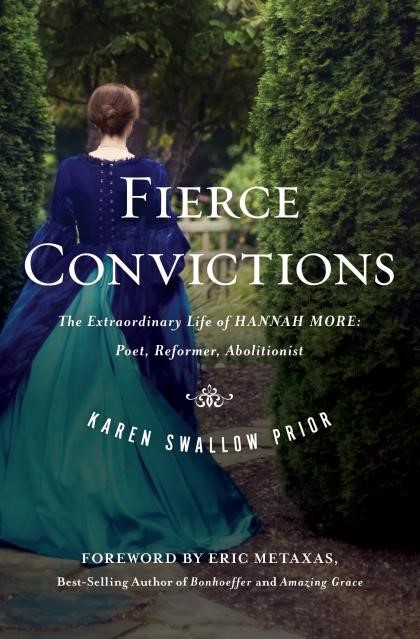Here at the very end of Women’s History Month, we are given a great opportunity to get to know a woman who was highly influential in progressing social reforms in Western society and in the literary world but who has been all but lost to history: Hannah More.
For a while now, I’ve been hearing great things about Karen Swallow Prior’s new book, Fierce Convictions: The Extraordinary Life of Hannah More–Poet, Reformer, Abolitionist. Although very prominent in literary, artistic, and influential circles in nineteenth century England, More’s name has faded away over time. Her style of writing fell out of style, her first biographer made her into more of a unrealistic saint than the actual fascinating human being she was, and she was subjected to ruthless attacks on her character. All of this led to us not knowing her name any more today.
Enter Karen Swallow Prior. Prior is a professor of English at Liberty University, is the author of Booked: Literature in the Soul of Me, and contributes to such publications as Christianity Today, The Atlantic, and Relevant magazine, among other publications. Prior had written her dissertation on the life of Hannah More and remained fascinated with her. When encouraged to write a popular biography detailing More’s story, she poured her heart and soul into the project.
Hannah More was born into modest circumstances in 1745 in England. She lived in a very stratified society, which viewed itself as a hierarchical ladder, with each rung supporting the rungs above and below it. Despite her humble beginnings, she was smart and witty and able to make friends across a wide array of social, political, and religious lines. She cared a great deal about education and as devout as she was, in many ways she was quite progressive for her time.
More’s career as an educator began when she established a school with her sisters in her city of Bristol. Later she would move to London and begin friendships with such prominent figures as the famous actor David Garrick and with such esteemed writers as Samuel Johnson. Garrick supported her work as a playwright. Although her plays were largely very well received and she was acclaimed in London high society, she eventually gave up her glamorous society life. Her Christian faith–always important to her–became even more central to her sense of purpose and life. Personal acclaim became far less important than living out her sense of mission and call.
The biggest transformation in her life came about when she read a book of letters by John Newton (author of the hymn “Amazing Grace” and former slave trader) called Cardiphonia. The book was focused around a vital, living Christianity, alive and full of heart. It was a personal faith. Later, a changed More came to know Newton personally, and they became allies in the fight against slavery. More became far less enamored with the glitz and glamour of London and much more interested in simply having a positive effect on society, easing suffering, and caring for those in need.












